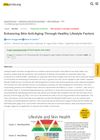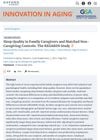 1 citations,
September 2023
1 citations,
September 2023 Healthy habits like good diet, sleep, exercise, and socializing can greatly improve skin health as you age.
 November 2023 in “Frontiers in Neuroendocrinology”
November 2023 in “Frontiers in Neuroendocrinology” Some people experience lasting sexual, psychological, and sleep problems after using finasteride or SSRI antidepressants, possibly due to similar underlying causes.
 9 citations,
July 2018 in “European journal of dermatology/EJD. European journal of dermatology”
9 citations,
July 2018 in “European journal of dermatology/EJD. European journal of dermatology” Disrupted sleep patterns can harm skin and hair cell renewal, but melatonin might help.
 4 citations,
February 2020 in “Dermatologic Therapy”
4 citations,
February 2020 in “Dermatologic Therapy” Poor sleep, meat-heavy diets, and junk food worsen hair loss, while sugary drinks may help.
January 2006 in “한국미용학회지” Unbalanced diet is the main cause of male pattern baldness, and rest and sleep are the best prevention.
 220 citations,
August 1988 in “Clinical endocrinology”
220 citations,
August 1988 in “Clinical endocrinology” Melatonin may help with sleep issues, depression, and cancer, but more research is needed.
 December 2021 in “Innovation in Aging”
December 2021 in “Innovation in Aging” Family caregivers take longer to fall asleep and have more sleep disturbances, which may contribute to their health problems.
 506 citations,
January 2012 in “Molecular and Cellular Endocrinology”
506 citations,
January 2012 in “Molecular and Cellular Endocrinology” Melatonin affects many body functions beyond sleep by interacting with specific receptors in various tissues.
 5 citations,
April 2022 in “Journal of Chromatography B”
5 citations,
April 2022 in “Journal of Chromatography B” The new method can measure sleep-related hormones in hair effectively and could help track long-term sleep patterns.
 1 citations,
November 2023 in “Brain and behavior”
1 citations,
November 2023 in “Brain and behavior” Spironolactone improved cognitive performance and early sleep quality but not manic symptoms, appetite, or body weight in bipolar disorder when added to sodium valproate.
 January 2023 in “Brazilian Journals Editora eBooks”
January 2023 in “Brazilian Journals Editora eBooks” Passiflora incarnata may help with anxiety and sleep issues but has side effects; teleconsultation for heart failure can improve quality of life; increased screen time for children during the pandemic led to more clinical complaints; older and severely affected COVID-19 patients are more likely to have long-term symptoms.
 44 citations,
October 2019 in “International Journal of Molecular Sciences”
44 citations,
October 2019 in “International Journal of Molecular Sciences” Melatonin, usually known for sleep regulation, also has antioxidant properties that can protect skin, stimulate hair growth, and improve skin conditions, with topical application being more effective than oral use.
 February 2024 in “Asian journal of medical sciences”
February 2024 in “Asian journal of medical sciences” Proper hygiene, adequate sleep, and self-care can reduce common skin diseases.
 88 citations,
October 2002 in “Journal of Dermatology”
88 citations,
October 2002 in “Journal of Dermatology” Finasteride for hair loss may cause depression, affecting sleep and relationships.
2 citations,
August 2022 in “Animals” Essential oils may improve dogs' health and melatonin can help with their sleep and anxiety, but both should be used carefully.

Clinicians should look for skin issues, sleep problems, cognitive changes, and food cravings as signs of insulin resistance.
Gushen Shengfa pills and Wuling capsules are more effective for hair growth and sleep quality than the control treatment.
16 citations,
January 2022 in “International journal of molecular sciences” Certain daily habits like stress, diet, and sleep can affect the severity of hair loss in alopecia areata.
 16 citations,
November 2020 in “PLOS ONE”
16 citations,
November 2020 in “PLOS ONE” Your lifestyle and health can affect your chances of getting COVID-19; not enough sleep, lots of exercise, and hair loss can increase risk, while washing hands, eating fruit daily, and taking vitamins A and C can lower it.
9 citations,
June 2013 in “Journal of Cosmetic Dermatology” Lateral oblique forehead lines are caused by muscle movement, not sleep positions, and can be treated with botulinum toxin A.
 May 2024 in “Internattional journal of current innovation in advance research”
May 2024 in “Internattional journal of current innovation in advance research” Lifestyle changes like a healthy diet, exercise, and proper sleep can help manage PCOD.
 19 citations,
January 2011 in “Obstetrics and gynecology international”
19 citations,
January 2011 in “Obstetrics and gynecology international” Red clover extract improved hair, skin, mood, sleep, and tiredness in postmenopausal women.

The CDC reports 23 measles cases in unvaccinated US kids, new treatments for eosinophilic esophagitis and osteopenia are approved, poor sleep may cause migraines, atopic dermatitis could lead to asthma, migraines might increase Crohn's disease risk, cancer may raise heart disease risk, gout is linked to prostate issues, Cabo Verde is malaria-free, social factors and vitamin D affect dementia risk, smoking increases hair loss risk, certain drugs might lower thyroid disease risk in arthritis, noma is a neglected disease, and meal timing could impact heart health.
 January 2018 in “Journal of general practice”
January 2018 in “Journal of general practice” Young people are losing hair due to stress, poor diet, pollution, and lack of sleep, but it can be treated with supplements and scalp treatments.
202 citations,
January 2022 in “Journal of Clinical Medicine” Women are more likely to have long-term post-COVID symptoms than men.
103 citations,
December 2021 in “Journal of biological rhythms” Shift work disrupts the body's natural clock, leading to health problems.
 92 citations,
May 2014 in “The American Journal of Medicine”
92 citations,
May 2014 in “The American Journal of Medicine” The conclusion is that early diagnosis and a multi-system treatment approach are crucial for managing PCOS and its associated health risks.
 81 citations,
May 2007 in “Fertility and Sterility”
81 citations,
May 2007 in “Fertility and Sterility” Testosterone therapy seems safe for postmenopausal women for a few years, but more research is needed for long-term effects.
 72 citations,
October 1998 in “Baillière's clinical endocrinology and metabolism”
72 citations,
October 1998 in “Baillière's clinical endocrinology and metabolism” Long-term testosterone therapy can cause hormone suppression, affect prostate and heart health, and alter physical characteristics, but does not increase prostate cancer risk and needs more research for full risk assessment.
 39 citations,
October 2015 in “Case Reports”
39 citations,
October 2015 in “Case Reports” Some people experience severe, long-lasting side effects from fluoroquinolone antibiotics, leading to the recommendation of limited use and increased awareness of these risks.























